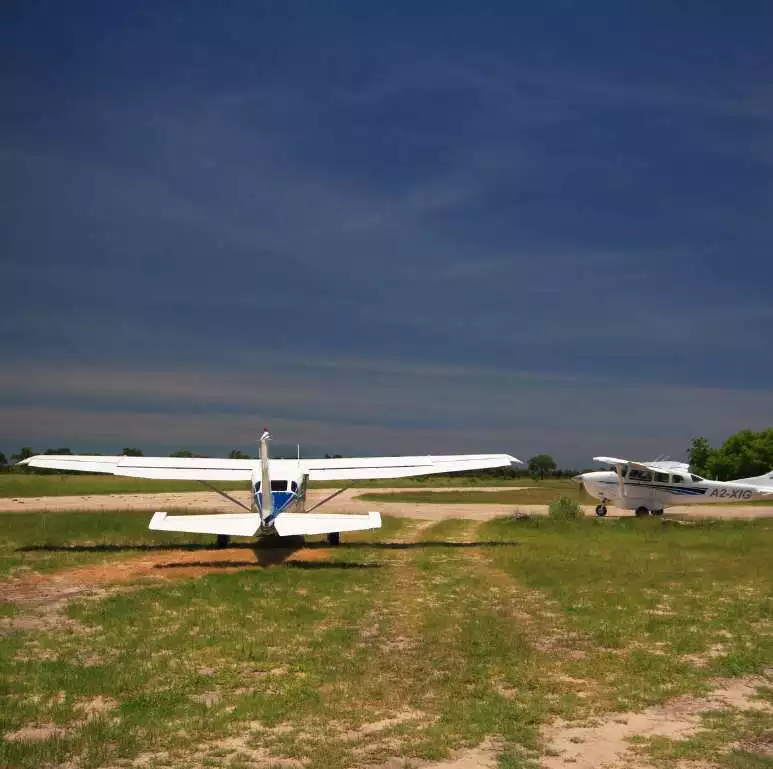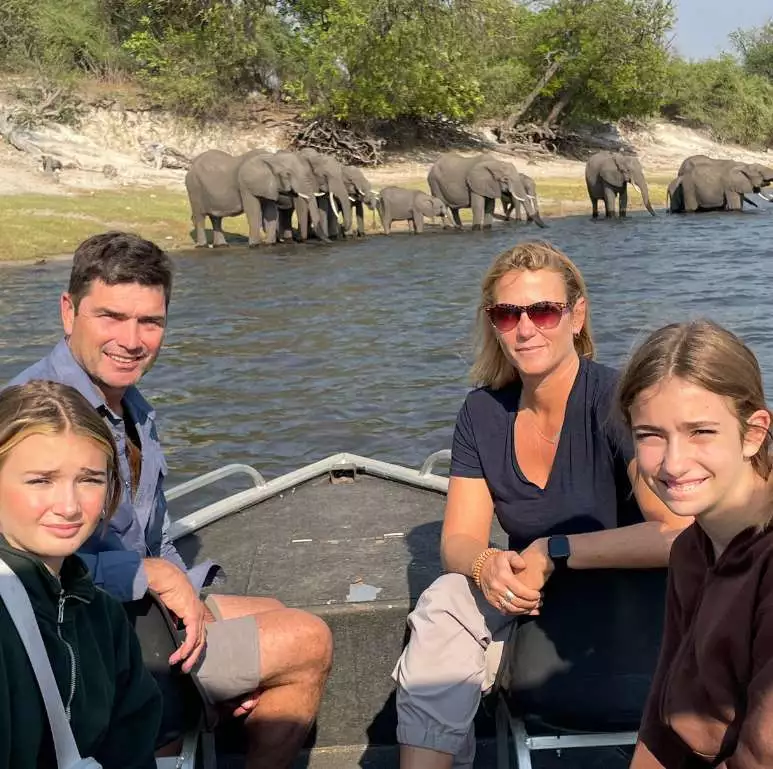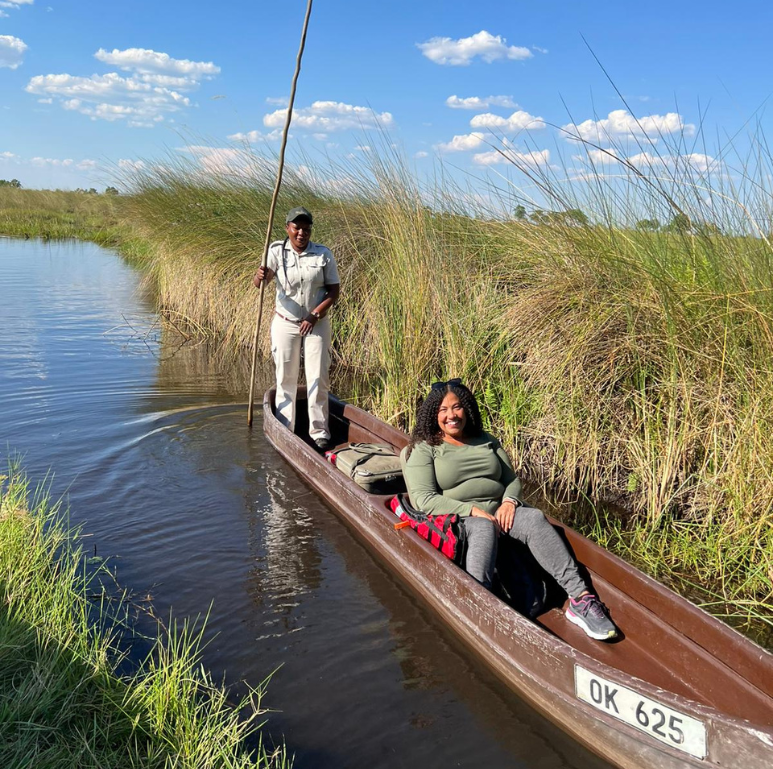Destination Focus
CHOBE OR THE OKAVANGO DELTA?
BOTSWANA
Lions in the Okavango Delta by Sarah Arnoff.
“Do we visit Chobe or the Okavango Delta, or both?” This is indeed the most common question asked by our travellers who wish to visit Botswana’s renowned wilderness areas. In essence, the major differences to consider between Chobe and the Okavango Delta are accessibility and affordability.
ACCESSIBILITY
The Chobe region is served by a local international airport (Kasane) located just 10-15 minutes’ drive from most lodges. Kasane Airport receives a daily flight direct from the region’s main hub, Johannesburg-OR Tambo in South Africa and offers travellers easy and quick access to the wildlife viewing in Chobe National Park, which adjoins both the airport and the town of Kasane. Chobe is also only a 2-2½ hour road transfer from Victoria Falls and is therefore a popular add-on – either as a day trip or a 1-2 night stay – for travellers visiting the falls and the surrounding Zambezi River region.
The Okavango Delta is reached by a flight in a light aircraft that can last 80-90 minutes from Kasane (located at the northern edge of the wilderness area) and 20-30 minutes from Maun (located at the southern edge). Maun Airport is a bit busier than Kasane Airport, and receives daily flights direct from Cape Town, Gaborone, Johannesburg-OR Tambo and Victoria Falls as well as 2-3 flights per week from Windhoek (Namibia). Once you arrive at your remote bush airstrip, you then take a game drive that can last anywhere between 10 minutes to three hours depending on the location of your camp/lodge. The Okavango Delta flights are operated by light aircraft and are very scenic but can at times be cramped, hot and/or noisy.

Okavango Delta flight by Darren Humphrys
AFFORDABILITY
Most Chobe accommodations are located just outside the national park and are therefore not faced with the additional cost of daily park fees as well as the expense of transporting supplies and staff long distances. The vast majority of accommodations are located within the small safari town of Kasane or close by, and are mostly on the banks of the Chobe River itself – like our preferred Chobe River Lodge. The ensuing ease of access to supplies and staff results in a much more affordable cost when compared to the camps/lodges in the Okavango Delta.
All Okavango Delta camps/lodges are located within a vast wilderness area that encompasses Moremi Game Reserve national park and a number of private reserves, called ‘concessions’. They are all faced with the associated high costs of National Park fees and levies as well as the expense of transporting supplies and staff, which are either flown in or travel by 4×4 over a day or two. In addition to this, all camps/lodges within the Okavango Delta are legally obliged to have the most minimal impact on the environment and thus the accommodation consists of luxury canvas tents rather than brick-and-mortar chalets. The idea behind this regulation is that each camp/lodge can pack up and leave without leaving any trace or footprint behind. These are not your normal style tents however, and you will be amazed at the luxury that is offered within this so-called tent in addition to the very high standard of service, cuisine and wildlife guiding.
THE LOCATION AND EXPERIENCE
Chobe is justifiably a popular wildlife destination because it provides a unique wildlife experience, being both water-based (i.e. boat safaris where you get extremely close to crocodiles, hippos, elephants, birdlife) and land-based (i.e. game drives where lion, hyena and jackal can often be seen as well as leopard, African wild dog plus a vast array of grazing animals). Because of its affordability and ease of access, the Chobe region is generally much busier than the Okavango Delta. Most visitors to Chobe National Park are in vehicles/boats that are shared with other lodge guests or day-trippers. There can be a large number of these vehicles/boats within the park at any given time during the day and this can potentially affect the enjoyment of your wildlife viewing. We however have an exclusive arrangement with Chobe River Lodge that all of our travellers are provided with their own guide and own vehicle/boat. This enables the guide to get to know your interests and personalise your wildlife viewing experience. It also enables him to spend more/less time at a sighting, whatever is your preference.

The Hughes family – Chobe National park
The Okavango Delta is one of the world’s last great wildernesses, pure and simple. To keep it this way, the Botswana government encourages a “high end-low density” policy that translates to an experience that is largely marketed towards upper income earners and offers a high standard of accommodation and guiding, with a low ratio of visitors per wildlife sighting. While this wise policy is intended to keep the Okavango special for many years to come, the ensuing cost to stay there does result in many visitors choosing to visit Chobe or other more affordable safari regions within Southern Africa.
The main difference between Okavango Delta accommodations is related to whether they are “water-based” or “land-based”. “Water-based” camp/lodges are generally surrounded by water most of the year and game drives are therefore not possible, with only water-based safaris in a local mokoro (dugout canoe) and/or motorised boat offered. Sometimes guided bush walks on nearby islands can also be offered. “Land-based” camp/lodges have year-round access to dry land and therefore offer game drives and bush walks, but no water-based activities because the only permanent water is too far away. Some land-based camp/lodges are however in the fortunate situation of also being located on or near permanent water and can therefore offer the whole array of wildlife viewing experiences – game drives, bush walks, mokoro safaris and motorised boat excursions. Generally speaking, the cost rises in direct relation to whether the camp/lodge is water-based, land-based or land+water-based.
Most of our preferred accommodations in the Okavango Delta are located in the concessions and are not within the borders of the national park. These concessions are located in prime locations that also enable the accommodations to offer you experiences that are not allowed when staying at accommodations located within Moremi Game Reserve:
- Game drives can depart before sunrise and continue after sunset.
2. Game drives can go off-road if required.
3. Bush walks with qualified, armed guides are offered.

Joy-Russcher – Okavango Delta
VISITING BOTH CHOBE AND THE OKAVANGO DELTA
While it’s not the shortest of flights, the 80-90 minute flight from Kasane into the Okavango Delta is no mere, boring journey. It’s probably one of the longest constantly-scenic flights in the world. The light aircraft flies at a relatively low altitude and offers continuous views of the wild landscape below. Coupled with the following game drive to finally get to your camp, it’s an amazing journey that you will no doubt remember forever. However, if this journey is combined with driving direct from Victoria Falls then it’s only natural to feel a little fatigued by the time you get to your camp and this can possibly dilute the enjoyment of your first night in the wilderness. Besides the previously mentioned wildlife viewing benefits, stopping over in Chobe can therefore also make good practical sense, especially for families with children or for travellers that might not endure the long journey so well. Whether you stay one night or two in Chobe, you have enough time on your final morning to enjoy a private game drive before returning to Chobe River Lodge for brunch and to freshen-up before we then take you the short distance to the airport for the flight into the Okavango Delta.
We hope this information assists with your planning. In a nutshell, both Chobe and the Okavango Delta offer exceptional wildlife experiences but there is a price to pay for the exclusivity of visiting the Okavango Delta, which is why more of our travellers choose to visit Chobe.
